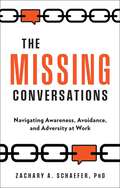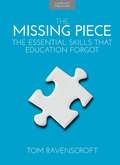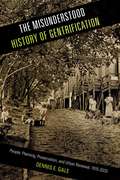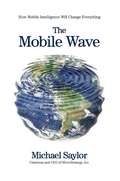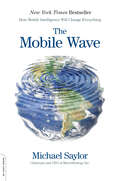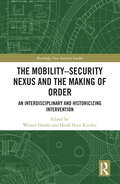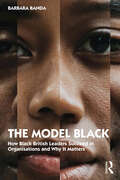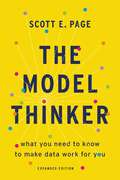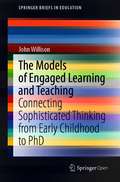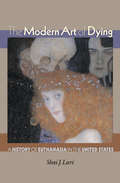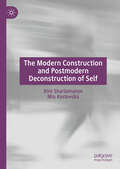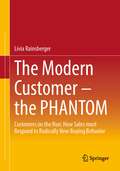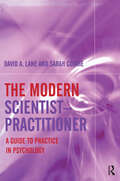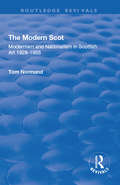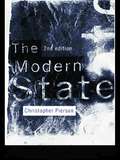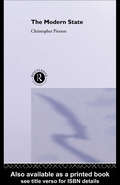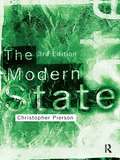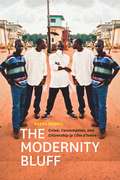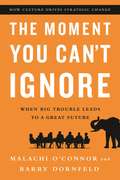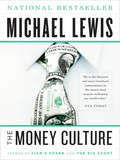- Table View
- List View
The Missing Conversations: Navigating Awareness, Avoidance, and Adversity at Work
by Zachary A. SchaeferThe Missing Conversations will give you and your team a framework to have higher quality conversations that directly and positively impact your business.What you don&’t know can hurt you—and what you don&’t talk about can absolutely destroy your team, your organization, and your career! In The Missing Conversations, speaker and leadership coach Zach &“Dr. Z&” Schaefer cracks open the playbook he&’s used with some of America&’s best and brightest companies to reveal the critical but all-too-often overlooked conversations that can make or break an organization. Drawing on his fifteen years of experience working with high-power, hard-charging executives and team leaders, Dr. Z examines more than forty key conversations you are probably not having. You&’ll discover: The impact the leader&’s &“echo&” has on employees as it reverberates throughout the organization. How to prevent team member burnout by recognizing their accomplishments while giving them a new goal to shoot for. The power of embracing effort itself as a talent that leaders can recognize and encourage in their teams. Why so many leaders allow groupthink and the &“disease to please&” to stifle productive problem solving and constructive disagreement. How to harness conflict as a catalyst for growth through healthy confrontation. Why team members and peers often feel blindsided by feedback and constructive criticism. In this book, Dr. Z reveals how addressing the root causes of communication breakdowns—lack of awareness, avoidance, and adversity—empowers leaders to unlock their team's full potential, drive innovation, and achieve sustainable success. If you&’re ready to create a workplace where open dialogue and collaboration flourish, it&’s time to start having The Missing Conversations!
The Missing Piece: The Essential Skills That Education Forgot
by Tom RavenscroftThere is a fundamental gap in education. While we focus on building knowledge and securing good grades there is something missing. All of us, whatever we do, need a core set of skills which go beyond the academic - to work with others, to manage ourselves, to communicate effectively, and to creatively solve problems. We might call them different things but we draw on them as much as numeracy or literacy. Tom Ravenscroft knows them as the enterprise skills. If we need them, our students need them even more. They underpin effective learning in the classroom. They stop students dropping out at university. They are more highly valued than academic grades by employers. They are a foundation for successful entrepreneurship. They are the enablers of civic engagement and social mobility. When we look to the next decades, in a world of increased automation, fragmented jobs and the need for constant learning it is these skills that will really set our children and young people up for future success. Yet as an education system, we behave as if they cannot or should not be taught. But they can be, and they must be. Tom Ravenscroft has writen this book almost a decade after he set up Enabling Enterprise as a social enterprise. He was a secondary school teacher and the Enabling Enterprise programme was for the students in his inner-city classroom. They were not learning enough in school, and were in no sense set up for the rest of their lives. Over the last ten years, he has had the enormous privilege of leading a growing team of teachers and has worked with hundreds of classroom teachers, thousands of employer volunteers and over 200,000 students. He has seen these students build those skills with the same rigour and focus as any other academic learning. And he has seen that when they are mastered, we truly allow our students to achieve their potential.
The Missing Piece: The Essential Skills That Education Forgot
by Tom RavenscroftThere is a fundamental gap in education. While we focus on building knowledge and securing good grades there is something missing. All of us, whatever we do, need a core set of skills which go beyond the academic - to work with others, to manage ourselves, to communicate effectively, and to creatively solve problems. We might call them different things but we draw on them as much as numeracy or literacy. Tom Ravenscroft knows them as the enterprise skills. If we need them, our students need them even more. They underpin effective learning in the classroom. They stop students dropping out at university. They are more highly valued than academic grades by employers. They are a foundation for successful entrepreneurship. They are the enablers of civic engagement and social mobility. When we look to the next decades, in a world of increased automation, fragmented jobs and the need for constant learning it is these skills that will really set our children and young people up for future success. Yet as an education system, we behave as if they cannot or should not be taught. But they can be, and they must be. Tom Ravenscroft has writen this book almost a decade after he set up Enabling Enterprise as a social enterprise. He was a secondary school teacher and the Enabling Enterprise programme was for the students in his inner-city classroom. They were not learning enough in school, and were in no sense set up for the rest of their lives. Over the last ten years, he has had the enormous privilege of leading a growing team of teachers and has worked with hundreds of classroom teachers, thousands of employer volunteers and over 200,000 students. He has seen these students build those skills with the same rigour and focus as any other academic learning. And he has seen that when they are mastered, we truly allow our students to achieve their potential.
The Misunderstood History of Gentrification: People, Planning, Preservation, and Urban Renewal, 1915-2020 (Urban Life, Landscape and Policy #84)
by Dennis E. GaleThe origins of gentrification date back to World War I—only it was sometimes known as “remodeling” then. Dennis Gale’s insightful book, TheMisunderstood History of Gentrification, provides a recontextualization of American gentrification, planning, and policymaking. He argues that gentrification must be understood as an urban phenomenon with historical roots in the very early twentieth century. Gale uses solid empirical evidence to trace the embryonic revitalization of Georgetown, Greenwich Village, Beacon Hill, and elsewhere back to 1915. He shows how reinvestment and restoration reversed urban decline and revitalized neighborhoods. The Misunderstood History of Gentrification also explains how federal policies such as the Urban Redevelopment Program (later named Urban Renewal), which first emerged in 1949, razed urban slums and created an “urban crisis” that persisted in the 1960s and ‘70s. This situation soon prompted city gentrifiers and historic preservationists to reuse and rehabilitate existing structures. Within a more expansive historical framework, Gale offers a fresh perspective on and debunks misperceptions about gentrification in America.
The Misunderstood History of Gentrification: People, Planning, Preservation, and Urban Renewal, 1915-2020 (Urban Life, Landscape and Policy #84)
by Dennis E. GaleThe origins of gentrification date back to World War I—only it was sometimes known as “remodeling” then. Dennis Gale’s insightful book, TheMisunderstood History of Gentrification, provides a recontextualization of American gentrification, planning, and policymaking. He argues that gentrification must be understood as an urban phenomenon with historical roots in the very early twentieth century. Gale uses solid empirical evidence to trace the embryonic revitalization of Georgetown, Greenwich Village, Beacon Hill, and elsewhere back to 1915. He shows how reinvestment and restoration reversed urban decline and revitalized neighborhoods. The Misunderstood History of Gentrification also explains how federal policies such as the Urban Redevelopment Program (later named Urban Renewal), which first emerged in 1949, razed urban slums and created an “urban crisis” that persisted in the 1960s and ‘70s. This situation soon prompted city gentrifiers and historic preservationists to reuse and rehabilitate existing structures. Within a more expansive historical framework, Gale offers a fresh perspective on and debunks misperceptions about gentrification in America.
The Mobile Wave
by Michael SaylorIn the tradition of international bestsellers, 'Future Shock' and 'Megatrends', Michael J. Saylor, CEO of MicroStrategy, brings 'The Mobile Wave', a ground-breaking analysis of the impact of mobile intelligence-the fifth wave of computer technology. 'The Mobile Wave' argues that the changes brought by mobile computing are so big and widespread that it's impossible for us to see it all, even though we are all immersed in it. Saylor explains that the current generation of mobile smart phones and tablet computers has set the stage to become the universal computing platform for the world. In the hands of billions of people and accessible anywhere and anytime, mobile computers are poised to become an appendage of the human being and an essential tool for modern life. With the perspective of a historian, the precision of a technologist, and the pragmatism of a CEO, Saylor provides a panoramic view of the future mobile world. He describes how: - A Harvard education will be available to anyone with the touch of a screen. - Cash will become virtual software and crime proof. - Cars, homes, fruit, animals, and more will be "tagged" so they can tell you about themselves. - Buying an item will be as easy as pointing our mobile device to scan and pay. - Land and capital will become more of a liability than an asset. - Social mobile media will push all businesses to think and act like software companies. - Employment will shift as more service-oriented jobs are automated by mobile software. Products, businesses, industries, economies, and even society will be altered forever as the Mobile wave washes over us and changes the landscape. With so much change, 'The Mobile Wave' is a guidebook for individuals, business leaders, and public figures who must navigate the new terrain as mobile intelligencechanges everything.
The Mobile Wave: How Mobile Intelligence Will Change Everything
by Michael SaylorIn the tradition of international bestsellers, Future Shock and Megatrends, Michael J. Saylor, CEO of MicroStrategy, brings The Mobile Wave, a ground-breaking analysis of the impact of mobile intelligence--the fifth wave of computer technology. The Mobile Wave argues that the changes brought by mobile computing are so big and widespread that it's impossible for us to see it all, even though we are all immersed in it. Saylor explains that the current generation of mobile smart phones and tablet computers has set the stage to become the universal computing platform for the world. In the hands of billions of people and accessible anywhere and anytime, mobile computers are poised to become an appendage of the human being and an essential tool for modern life. With the perspective of a historian, the precision of a technologist, and the pragmatism of a CEO, Saylor provides a panoramic view of the future mobile world. He describes how: A Harvard education will be available to anyone with the touch of a screen. Cash will become virtual software and crime proof. Cars, homes, fruit, animals, and more will be "tagged" so they can tell you about themselves. Buying an item will be as easy as pointing our mobile device to scan and pay. Land and capital will become more of a liability than an asset. Social mobile media will push all businesses to think and act like software companies. Employment will shift as more service-oriented jobs are automated by mobile software. Products, businesses, industries, economies, and even society will be altered forever as the Mobile wave washes over us and changes the landscape. With so much change, The Mobile Wave is a guidebook for individuals, business leaders, and public figures who must navigate the new terrain as mobile intelligence changes everything.
The Mobility-Security Nexus and the Making of Order: An Interdisciplinary and Historicizing Intervention (Routledge New Security Studies)
by Heidi Hein-Kircher Werner DistlerThe book explores the complex, multi-directional connections of the "mobility/security nexus" in the re-ordering of states, empires, and markets in historical perspective. Contributing to a vivid academic debate, the book offers in-depth studies on how mobility and security interplay in the emergence of order beyond the modern state. While mobilities studies, migration studies and critical security studies have focused on particular aspects of this relationship, such as the construction of mobility as a political threat or the role of infrastructure and security, we still lack comprehensive conceptual frameworks to grasp the mobility/security nexus and its role in social, political, and economic orders. With authors drawn from sociology, International Relations, and various historical disciplines, this transdisciplinary volume historicizes the mobility-security nexus for the first time. In answering calls for more studies that are both empirical and have historical depth, the book presents substantial case studies on the nexus, ranging from the late Middle Ages right up to the present-day, with examples from the British Empire, the Russian Empire, the Habsburg Empire, Papua New Guinea, Rome in the 1980s or the European Union today. By doing so, the volume conceptualizes the mobility/security nexus from a new, innovative perspective and, further, highlights it as a prominent driving force for society and state development in history. This book will be of much interest to researchers and students of critical security studies, mobility studies, sociology, history and political science.
The Mobilization of the Unemployed in Europe
by Didier Chabanet Jean FanielIn the face of high unemployment in Europe for the past thirty years, the unemployed have organized themselves and mobilized at levels ranging from the local to the transnational. This work explores why, when, and how the unemployed move from acquiescence to protest.
The Model Black: How Black British Leaders Succeed in Organisations and Why It Matters
by Barbara BandaThis book is for anyone who wants to understand what being more inclusive at work means, especially as it relates to black leaders. It is intended for those people who are saying “I don’t know where to start,” “I don’t know what to do” and “I don’t know what to say” when understanding and talking about race at work. Based on candid interviews with 30 successful black leaders, it peels away the multifaceted layers of black British leaders in organisations to offer a new way of thinking about the black British experience. This book provides the insights and ideas required to have positive conversations about race at work and to create work environments where black leaders can thrive. In identifying the attributes and behaviours that successful black leaders have in common, this book offers new ways of thinking about black people at work that help to further inclusion. It shines a light on the daily reality of being a black leader in the workplace, providing an alternative entry point for conversations around inclusion and explores what individuals and organisations can do to increase inclusion in the workplace. Through first-hand stories this book explores the challenges, compromises, struggles and successes that black people encounter, and the range of strategies they employ to achieve success as they navigate the “white” workplace. It is essential reading for business leaders in the private, public and third sector, human resources professionals, students, anyone teaching or mentoring black students or leaders and everyone interested in understanding race and furthering inclusion in the workplace.
The Model Thinker: What You Need to Know to Make Data Work for You
by Scott E. PageHow anyone can become a data ninja From the stock market to genomics laboratories, census figures to marketing email blasts, we are awash with data. But as anyone who has ever opened up a spreadsheet packed with seemingly infinite lines of data knows, numbers aren't enough: we need to know how to make those numbers talk. In The Model Thinker, social scientist Scott E. Page shows us the mathematical, statistical, and computational models--from linear regression to random walks and far beyond--that can turn anyone into a genius. At the core of the book is Page's "many-model paradigm," which shows the reader how to apply multiple models to organize the data, leading to wiser choices, more accurate predictions, and more robust designs. The Model Thinker provides a toolkit for business people, students, scientists, pollsters, and bloggers to make them better, clearer thinkers, able to leverage data and information to their advantage.
The Models of Engaged Learning and Teaching: Connecting Sophisticated Thinking from Early Childhood to PhD (SpringerBriefs in Education)
by John WillisonThis book provides a practical philosophy for promoting students' sophisticated thinking from Early Childhood to PhD in ways that explicitly interconnect across the years of education. It will help teachers, academics and the broader learning and teaching community to understand and implement these connections by introducing a conceptual framework, the Models of Engaged Learning and Teaching (MELT). By covering the nature, philosophy, practice and implications of MELT for teachers and students alike, the book will help teachers to facilitate students’ awareness of, and increasing responsibility for, the thinking demanded by subject and discipline-specific learning as well as interdisciplinary learning, whether face to face, online or in blended modes. The book will also provide educators with ways to effectively engage with complex, and sometimes conflicting, contemporary educational concepts, and with a diverse variety of colleagues involved in the learning and teaching enterprise.The book provides guidance that allows curriculum improvement, teacher action research and larger-scale research to be reported on from a common perspective, bridging the gap between those readers focused on research and those focused on teaching. The book shares valuable insights and ways of addressing the contemporary issue of discipline-based learning versus transdisciplinary learning, reducing the dichotomy and enabling the two approaches to complement each other.This is an Open Access book.
The Modern Art of Dying: A History of Euthanasia in the United States
by Shai J. LaviHow we die reveals much about how we live. In this provocative book, Shai Lavi traces the history of euthanasia in the United States to show how changing attitudes toward death reflect new and troubling ways of experiencing pain, hope, and freedom. Lavi begins with the historical meaning of euthanasia as signifying an "easeful death." Over time, he shows, the term came to mean a death blessed by the grace of God, and later, medical hastening of death. Lavi illustrates these changes with compelling accounts of changes at the deathbed. He takes us from early nineteenth-century deathbeds governed by religion through the medicalization of death with the physician presiding over the deathbed, to the legalization of physician-assisted suicide. Unlike previous books, which have focused on law and technique as explanations for the rise of euthanasia, this book asks why law and technique have come to play such a central role in the way we die. What is at stake in the modern way of dying is not human progress, but rather a fundamental change in the way we experience life in the face of death, Lavi argues. In attempting to gain control over death, he maintains, we may unintentionally have ceded control to policy makers and bio-scientific enterprises.
The Modern Construction and Postmodern Deconstruction of Self
by Kire Sharlamanov Mia KostovskaThis book aims to explain the self as understood decades ago and its evolution in the time of postmodernism. Approaching it primarily from a sociological perspective, while incorporating insights from psychology and philosophy, it portrays the modern self as a unitary, coherent, unified subject created in the time of modernity, which during postmodernism has evolved into a fluid, decentralized, and fragmented subject with increasingly independent multiple identities. The creation of the modern self has been influenced by individualization, rationalization, and power. Each factor is explored in a separate chapter, detailing its impact on the development of the modern Cartesian self. The authors draw on the theories of Goffman, Bauman, and Baudrillard to illustrate the changing nature of the self, viewing it as a performer, a fluid entity, and a simulacrum. While Goffman is not strictly a postmodern author, his ideas foreshadow postmodernism, particularly regarding the transformation of the self. Bauman and Baudrillard, as key figures in postmodern thought, provide valuable insights into this transformation of the self in contemporary times. The book uniquely connects two time periods in which the self evolves, arguing that social factors influence its changing characteristics. As these social factors shift over time, so does the self. Key aspects of the self and its evolution are examined through an original, multidimensional approach that spans a longer time interval.
The Modern Customer – the PHANTOM: Customers on the Run: How Sales must Respond to Radically New Buying Behavior
by Livia RainsbergerThis book shows how companies can - and must - adapt their sales strategies and processes to changing customer expectations in times of digital transformation and markets volatility. How can sales address, win and retain the modern customer, an intangible PHANTOM in the digital space?The digital world is characterized by eagerness, ease and enthusiasm. Nowadays, people have unlimited and instant access to manifold information and thus they believe to be knowledgeable, autonomous and independent. As customers, they actively elude traditional sales and marketing on their way to a buying decision - in B2C and B2B alike. To reach these modern customers, companies must synchronize their sales approaches with their customers' decision-making processes and rethink selling. In this context, the author offers a wealth of suggestions with examples and provocative theses. A stirring and inspiring book for anyone interested in state-of-the-art sales and marketing: sales management and staff or entrepreneurs and start-ups.
The Modern Prison Paradox
by Amy E. LermanIn The Modern Prison Paradox, Amy E. Lerman examines the shift from rehabilitation to punitivism that has taken place in the politics and practice of American corrections. She argues that this punitive turn has had profoundly negative consequences for both crime control and American community life. Professor Lerman's research shows that spending time in America's increasingly violent and castigatory prisons strengthens inmates' criminal networks and fosters attitudes that increase the likelihood of criminal activity following parole. Additionally, Professor Lerman assesses whether America's more punitive prisons similarly shape the social attitudes and behaviors of correctional staff. Her analysis reveals that working in more punitive prisons causes correctional officers to develop an "us against them" mentality while on the job, and that the stress and wariness officers acquire at work carries over into their personal lives, straining relationships with partners, children, and friends.
The Modern Scientist-Practitioner: A Guide to Practice in Psychology
by Sarah Corrie David A. LaneThe Modern Scientist-Practitioner argues for a radical rethink of how we understand the science-practice relationship and the notion of the scientist-practitioner model. Drawing on the latest innovations and research from the fields of anthropology, industry, philosophy, psychology and science, David Lane and Sarah Corrie present a new vision of the scientist-practitioner model that is dynamic, contextualised and synergistic. Subjects covered include: innovation and improvization: The unacknowledged world of the creative scientist-practitioner. what kind of scientists are we? re-examining the Nature of Scientific knowledge. acquiring the art of reasoning: straddling the worlds of rigour and meaning. arriving at shared psychological narratives: formulation and explanation. the scientist-practitioner in applied psychology settings. learning for tomorrow: professional survival in an uncertain world. This timely and thought-provoking book will appeal to professionals at all stages of their careers, including psychologists of all disciplines, researchers, educators, policy-makers, healthcare professionals and students.
The Modern Scot: Modernism and Nationalism in Scottish Art, 1928-1955 (Routledge Revivals Ser.)
by Tom NormandThis title was first published in 2000: An investigation of Scottish art between 1928 and 1955 to bring into focus the multifaceted project that was Scottish modernism. At the core of this work lies the contention that Scottish modernism was underpinned by a desire to express a national consciousness. It was this ambition which became the defining feature of radical Scottish art, setting the parameters of its relationship with the idea of a coherent and international modern movement. With the foundation of the National Party of Scotland in 1928, Scottish intellectuals began to consider the nature of national identity and the characteristics of a national art. The "Scottish Renaissance Movement", under the voluble leadership of Hugh MacDiarmid, set out to articulate these interests, developing a vernacular poetry and literature. For Scottish artists, the way forward was harder to identify, as they fought to reconcile the demands for a Scottish national art with the stylistic revolution of international modernism. Tom Normand examines the competing claims of nationalism and modernism as they affected Scottish art. This in-depth analysis of a dynamic episode in Scottish visual culture looks at the work of, among others, William Johnstone, William McCance and John Duncan Fergusson.
The Modern State
by Christopher PiersonThe modern state is hugely important in our everyday lives. It takes nearly half our income in taxes. It registers our births, marriages and deaths. It educates our children and pays our pensions. It has a unique power to compel, in some cases exercising the ultimate sanction of preserving life or ordering death. Yet most of us would struggle to say exactly what the state is.The Modern State offers a clear, comprehensive and provoking introduction to one of the most important phenomena of contemporary life. Topics covered include:* the nation state and its historical context* state and economy* state and societies* state and citizens* international relations* the future of the state
The Modern State
by Christopher PiersonThe modern state is hugely important in our everyday lives. It takes nearly half our income in taxes. It registers our births, marriages and deaths. It educates our children and pays our pensions. It has a unique power to compel, in some cases exercising the ultimate sanction of preserving life or ordering death. Yet most of us would struggle to say exactly what the state is.The Modern State offers a clear, comprehensive and provoking introduction to one of the most important phenomena of contemporary life. Topics covered include:* the nation state and its historical context* state and economy* state and societies* state and citizens* international relations* the future of the state
The Modern State
by Christopher PiersonThe new edition of this well-established and highly regarded textbook continues to provide the clearest and most comprehensive introduction to the modern state. It examines the state from its historical origins at the birth of modernity to its current jeopardized position in the globalized politics of the 21st Century. The book has been entirely revised and updated throughout, including substantial new material on the financial crisis and the environment. Subjects covered include: • The evolution of the state system • Placing the state in modernity• States and societies • State and economy • States and citizens • States and the international order • States of the twenty-first century This book is essential reading for all those studying the state, international relations and comparative politics.
The Modernity Bluff: Crime, Consumption, and Citizenship in Côte D'Ivoire
by Sasha NewellIn Côte d’Ivoire, appearing modern is so important for success that many young men deplete their already meager resources to project an illusion of wealth in a fantastic display of Western imitation, spending far more than they can afford on brand name clothing, accessories, technology, and a robust nightlife. Such imitation, however, is not primarily meant to deceive—rather, as Sasha Newell argues in The Modernity Bluff, it is an explicit performance so valued in Côte d’Ivoire it has become a matter of national pride. Called bluffeurs, these young urban men operate in a system of cultural economy where reputation is essential for financial success. That reputation is measured by familiarity with and access to the fashionable and expensive, which leads to a paradoxical state of affairs in which the wasting of wealth is essential to its accumulation. Using the consumption of Western goods to express their cultural mastery over Western taste, Newell argues, bluffeurs engage a global hierarchy that is profoundly modern, one that values performance over authenticity—highlighting the counterfeit nature of modernity itself.
The Modernity Bluff: Crime, Consumption, and Citizenship in Côte d’Ivoire
by Sasha NewellIn Côte d’Ivoire, appearing modern is so important for success that many young men deplete their already meager resources to project an illusion of wealth in a fantastic display of Western imitation, spending far more than they can afford on brand name clothing, accessories, technology, and a robust nightlife. Such imitation, however, is not primarily meant to deceive—rather, as Sasha Newell argues in The Modernity Bluff, it is an explicit performance so valued in Côte d’Ivoire it has become a matter of national pride. Called bluffeurs, these young urban men operate in a system of cultural economy where reputation is essential for financial success. That reputation is measured by familiarity with and access to the fashionable and expensive, which leads to a paradoxical state of affairs in which the wasting of wealth is essential to its accumulation. Using the consumption of Western goods to express their cultural mastery over Western taste, Newell argues, bluffeurs engage a global hierarchy that is profoundly modern, one that values performance over authenticity—highlighting the counterfeit nature of modernity itself.
The Moment You Can't Ignore: When Big Trouble Leads to a Great Future
by O'ConnorNot just another day at the office . . . or is it? The surgical technician ducks as a stapler flies past his head during the concluding moments of a lengthy and difficult operation. . . . The high-powered, internationally known finance guru seeks to turn fortunes around at the university of which he is now president . . . and finds himself a leader without followers. . . . The powerful satraps silently sabotage the CEO’s desperately needed growth initiative. . . . These are "moments that cannot be ignored”--events, actions, comments that stop people in their tracks and, in one fell swoop, make it blindingly clear that an organization is stuck and unable to move forward. And they have become regular occurrences in today’s corporations, non-profits, and educational institutions as new forms of work, communication, and technology expose the ways in which an organization’s culture--or "the way we do things around here”--conflicts with new competitive demands. The result: telling incidents--all too visible elephants in the room--that reveal underlying conflicts as well as hidden assets. In The Moment You Can’t Ignore, Malachi O’Connor and Barry Dornfeld tell fascinating "you are there” stories of people and organizations as they encounter and then navigate through and beyond these un-ignorable moments, and show what we can learn from them. They outline the big questions organizations need to ask themselves about identity, leadership, and the capacity to innovate that an understanding of culture can help answer, and deliver powerful insights into recognizing and harnessing hidden assets that point in the direction of a new future. In our age of porous organizations and constant change, The Moment You Can’t Ignore demonstrates that the adage, "culture eats strategy for lunch,” is more relevant now than ever.
The Money Culture
by Michael LewisThe classic warts-and-all portrait of the 1980s financial scene. The 1980s was the most outrageous and turbulent era in the financial market since the crash of '29, not only on Wall Street but around the world. Michael Lewis, as a trainee at Salomon Brothers in New York and as an investment banker and later financial journalist, was uniquely positioned to chronicle the ambition and folly that fueled the decade.
